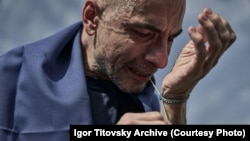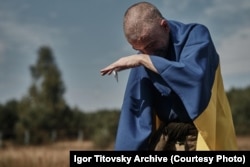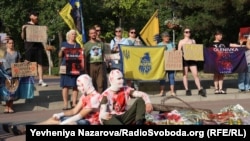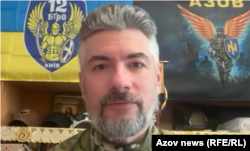As Russian forces besieged the last bastion of Ukrainian resistance in the devastated city of Mariupol, Ihor Titovskiy prepared his family for the worst, giving them instructions for his funeral in an emotional phone call in May 2022.
"I said there was no need to panic: Just receive my body and bury it," Titovskiy, a senior lieutenant at the time and now a captain, told RFE/RL. "It was painful for my mom to hear, but there was no getting around it."
"Morally, practically all the remaining personnel…understood that we wouldn't survive," he said in an interview. "It was only a question of time, when it would happen."
The funeral can wait, though. Not long after that call, Titovskiy and the other Ukrainians holed up at the Azovstal steelworks -- many of them fellow members of the Azov Brigade -- surrendered on orders from Kyiv and were taken captive, cementing Russia's takeover of a once-thriving city laid to waste three months into Moscow's full-scale invasion of Ukraine.
For Titovskiy, after 86 days at Azovstal, the ordeal had just begun. He and other prisoners endured severe beatings, electric shocks, hunger, and other abuse, he said, before he was freed in a prisoner swap 846 days later. When he was bused to Belarus and brought across the border to Ukraine in September 2024, he weighed just 50 kilograms.
Lucky To Survive
From Mariupol, Titovskiy and many other members of the Azov Brigade were taken to a prison in Olenivka in a part of the Donetsk region long occupied by Russia. There, he said, he was lucky to survive one of the deadliest single incidents in the war: powerful blasts that killed at least 50 prisoners on the night of July 28-29, 2022.
Ukrainian President Volodymyr Zelenskyy has called the blasts "a deliberate Russian war crime." The United Nations disbanded a fact-finding mission the following January after Russia impeded efforts to investigate, disturbing physical evidence and refusing to give UN monitors access to the site.
Titovskiy, 43, said he survived by a quirk of fate. Assigned to a watch shift, he was stepping outside when an explosion ripped through his barracks, blowing him out through the doorway and injuring an arm and a leg. He went back into the burning building several times but saw no sign of the men whose bunks had been near his.
"My bunk was the second from the top; my friend slept below me. It was as if they had never existed," he said. "I went in three or four times, pulled out more guys. But I couldn't find my bunk, my brothers, or my things. Nothing at all. Where there had been eight bunks there was just an empty space."
Russia claimed the blasts were caused by HIMARS rockets launched by Ukrainian forces, but the UN Human Rights Office concluded that was false, saying, "The pattern of structural damage appeared consistent with a projected ordnance having traveled on an east-to-west trajectory" -- in other words, from deeper in Russian-held territory.
"The lack of accountability for the deaths and injuries at the penal colony in Olenivka fits into the broader context of widespread and routine torture of Ukrainian POWs," the UN said in 2024, also describing what it said were "deplorable conditions of detention" for many POWs.
"Russian authorities have subjected Ukrainian POWs to systematic and widespread torture, including sexual violence, and poor conditions," the same UN Human Rights Office said in a report published in February, three years into the full-scale invasion. "Torture has been pervasive during interrogation and throughout all stages of captivity."
For Titovskiy, the worst of the abuse and mistreatment that many would describe as torture came later. From Olenivka, he and other survivors of the blasts were sent to a jail in Taganrog, a Russian city not far from the border, where they were greeted immediately with brutal violence, he said.
"They beat us, if you can call it that," he said, suggesting a level of abuse that the word does not adequately describe. "There were guys who were 20 years old, fit and strong -- but even they lost consciousness, they were beaten so badly."
The Russians were particularly violent "if they saw tattoos, and Azov members have very many of those," Titovskiy said. "Any crossed lines were considered a swastika. You could explain to them 300 times that it's an abstraction, but all the same, to them we are Nazis."
The Azov Brigade
Now part of the Ukrainian National Guard, the Azov Brigade was formed as volunteer battalion out of a right-wing militia in May 2014, shortly after Russia seized the Crimean Peninsula from Ukraine and fomented war in the eastern region known as the Donbas.
Russian officials have seized on the origins of the Azov Brigade and its zigzag symbol to support the false assertion that Ukraine is controlled or dominated by neo-Nazis -- one of the main narratives the Kremlin uses to attempt to justify the war.
Titovskiy, who is from Ukraine's Zaporizhzhya region, joined the military in 2014, eager to defend the country as the Russian onslaught began. He started serving with the Azov Brigade in November 2021.
Over the three months he spent at the jail in Taganrog, Titovskiy said, he was subjected to a three-day interrogation "where my legs were beaten."
"Really, my entire left side was beaten so badly that it turned black. One leg even started to fester. I couldn't stand on it because the festering reached the ankle joint," he said. He was then sent to Crimea "for amputation," he said, but his leg was not amputated. Instead, he was treated with antibiotics that healed the wound.
After that, Titovskiy was sent to a jail deeper in Russia, in the city of Kamyshin, where he said Federal Security Service (FSB) officers subjected him to electric shocks.
"It was a new hell, because they loved shockers very much there," he told RFE/RL. "It was the first time I'd encountered this."
"The FSB [guards] interrogated me with an electric current for two days" upon arrival, he said. "They put a sack over my head, tied my hands behind my back, and threw me to the ground…. Two of them sat on me and they turned on the current."
The jailers at Kamyshin used electric shock and other methods, including setting dogs on the prisoners in attempts to get them to confess to killing civilians in Mariupol, Titovskiy said.
"They beat [us] with their hands, with their feet, with truncheons, and with plastic water pipes," he said. "When my weight dropped to 50 kilograms, they said, 'Tense your stomach muscles, we're going to punch you now.' And then they asked, 'How was that punch, was it good?'"
Titovskiy's normal weight is 70 kilograms. At the jail in Kamyshin, prisoners were given "150 grams of kasha three times a day," he said. "For a grown man, that is very little."
Moreover, they were forced to eat quickly, and if someone didn't finish in time, they would all be punished with smaller portions at the next meal, Titovskiy said.
Prisoners were not given socks or underwear, and Titovskiy used the same toothbrush for all of his nearly two years at the jail: "They gave us one bar of soap for 16 people. There was practically no toilet paper, toothbrushes, or toothpaste."
These dire conditions changed only when an official commission came to the jail or, on one occasion, when there was a visit from representatives of the Red Cross -- and even then, the prisoners were given items for show but in some cases forbidden to use them, he said.
In September 2024, Titovskiy was moved again, to Belgorod, where he and his fellow prisoners were surprised by the polite behavior of the guards and "perfectly white sheets and towels" in their cells.
"In the morning they brought us out and a [Russian] special forces officer says, ‘Guys, you're going home. Say hi to your families,'" he said.
But Titovskiy had heard this before, only to be sent back to jail, so he didn't believe it at first. His hopes were high though when they boarded a civilian bus, which took them to the Ukrainian border.
It was Friday, September 13, and "when we got off the bus, we saw a sign and started to laugh: The clock said the time was 13:13," Titovskiy recalled.
"Later I said that if anyone tells me 13 is an unlucky number or Friday the 13th is a cursed date, I can confidently spit in their eye," he told RFE/RL. "It was the happiest date and the happiest day of my life. To return to your homeland -- I have no words. It's something else."















Forum